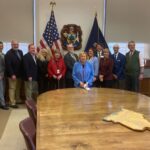Sen. Brenner introduces legislation to promote renewable energy on PFAS-contaminated land
AUGUSTA — On Thursday, Sen. Stacy Brenner, D-Scarborough, introduced a bill to promote the reuse of PFAS-contaminated land for renewable energy projects. LD 1591, “An Act to Promote Economic Reuse of Contaminated Land Through Clean Energy Development,” was the subject of a public hearing before the Joint Standing Committee on Energy, Utilities and Technology.
“PFAS has been devastating to farms all over Maine. I have seen fellow farmers fall on hard times because of this crisis,” said Sen. Brenner. “Currently, there is no way to remediate PFAS contamination in soils. Farms across Maine are facing the fact that their land is no longer usable for agricultural purposes. This has enormous implications for the financial stability of farmers and their families. This legislation would ensure that farmers whose farms have been contaminated by forever chemicals would be able to repurpose their land for solar projects.”
LD 1591 would promote the economic reuse of contaminated land, including farmland impacted by PFAS contamination, through renewable energy projects that guarantee ratepayer savings. This legislation establishes a competitive procurement of 5% based on Maine’s 2021 retail electricity sales. This competitive rate applies to all Class 1A resources operating on land that can no longer support agriculture, particularly PFAS-contaminated land.
PFAS, also called “forever chemicals,” have been found on at least 56 Maine farms in high amounts. These levels were discovered in the first tier of the state’s ongoing sludge investigation. Forever chemicals can be found in the soil and groundwater, adversely affecting water and food supplies across the state. Such contamination has forced many farmers to permanently close their businesses, eliminating their main source of income and ruining their way of life. LD 1591 would incentivize farmers to rebuild their businesses, while also contributing to ongoing efforts to expand the use of renewable energy.
There are currently 557 megawatts of solar power installed in Maine. Since 2019, the number of solar projects has grown. The growing number of renewable energy projects directly addresses the current climate crisis by providing an alternative to fossil fuels. This legislation simultaneously contributes to increasing the use of solar in Maine while also offering a solution to help farmers who are facing challenges due to PFAS contamination.
PFAS has been connected to numerous health risks such as kidney cancer, elevated cholesterol and reduced infant birthweight. Currently, there isn’t a way to remove PFAS from the human body. It also cannot break down PFAS on its own, meaning that these forever chemicals can remain in human body for decades.
LD 1591 faces further action in committee.
###


